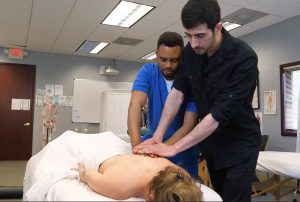Massage Therapist Skills
April 23, 2015
Think you have what it takes to succeed in massage therapy? Well, if you’re training with First Institute, so do we! Within the Massage Therapy program, you’ll learn the ins and outs of proper massage therapy, as well as gather a deeper understanding of the massage business as a whole. Here, we explain what we think are the most important massage therapist skills. For those currently in the program or future students, you may want to pay particular attention to these areas.
Anatomy & Physiology: Clients will want to know that you understand the human body and its components. Thorough knowledge of the body’s inner-workings is what separates a good massage therapist from a great one.
Business Skills: It’s tough to both attract and retain clients without proper business skills. New massage therapists should consult seasoned massage veterans to decide the best plans regarding hourly rates, advertising and marketing, and tip standards.
Massage Modalities: Modalities are the specific massage techniques used to treat clients. From Swedish Massage and Shiatsu to deep-tissue and more, massage therapists can specializes in a number of techniques to attract a diverse client base.
People Skills: Good people skills go hand-in-hand with business skills. If you don’t work well with others, including both coworkers and clients, you won’t have an easy road ahead of you. Massage therapy should be a relaxing experience, which means that your clients shouldn’t be on-edge because of your poor people skills.
Sanitation: One of the easiest ways to create a professional image is to maintain a sanitary massage environment. Make sure to wash your massage table between every session, as well as the sheets or any chairs you may use. Your clients will appreciate a clean massage setting, which will make it easier to maintain your business relationship.
Written Organization: Some massage therapy clients will be one-timers, while others will require ongoing treatment – especially if they’ve suffered from an injury. You’ll need to chart treatment details and take note of all progress for every client, for both medical records and to determine the best treatment options moving forward.
If you can master these six functions, you’ll be well on your way to a successful career in massage therapy. Of course, you’ll also need practical massage therapy skills, too, but your training in First Institute’s Massage Therapy program will help you acquire those along the way.
More on Massage Therapy:

